新概念英语二Lesson 9 A Cold Welcome 课件 (共23张PPT)
文档属性
| 名称 | 新概念英语二Lesson 9 A Cold Welcome 课件 (共23张PPT) | 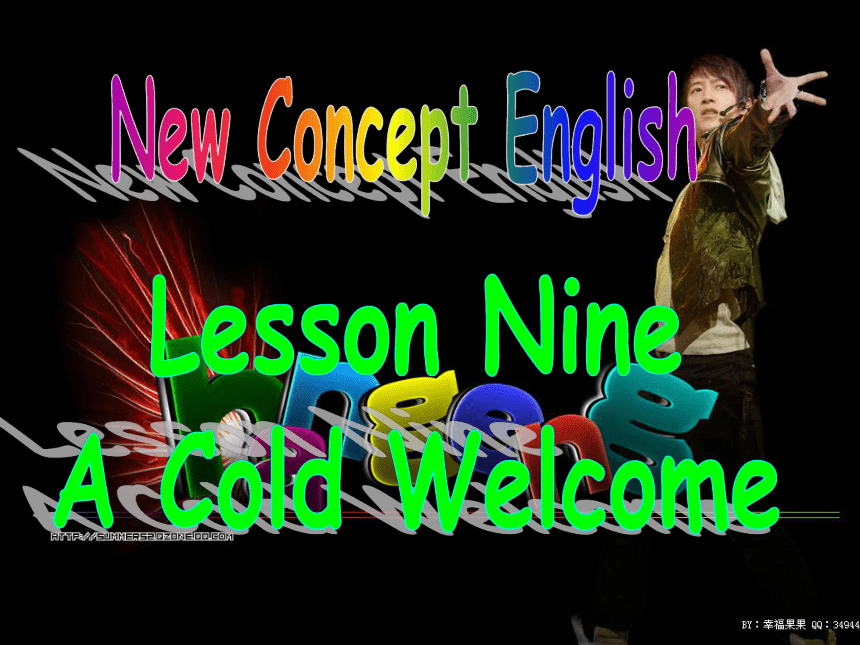 | |
| 格式 | ppt | ||
| 文件大小 | 1.3MB | ||
| 资源类型 | 教案 | ||
| 版本资源 | 新概念英语 | ||
| 科目 | 英语 | ||
| 更新时间 | 2023-10-06 09:56:39 | ||
图片预览

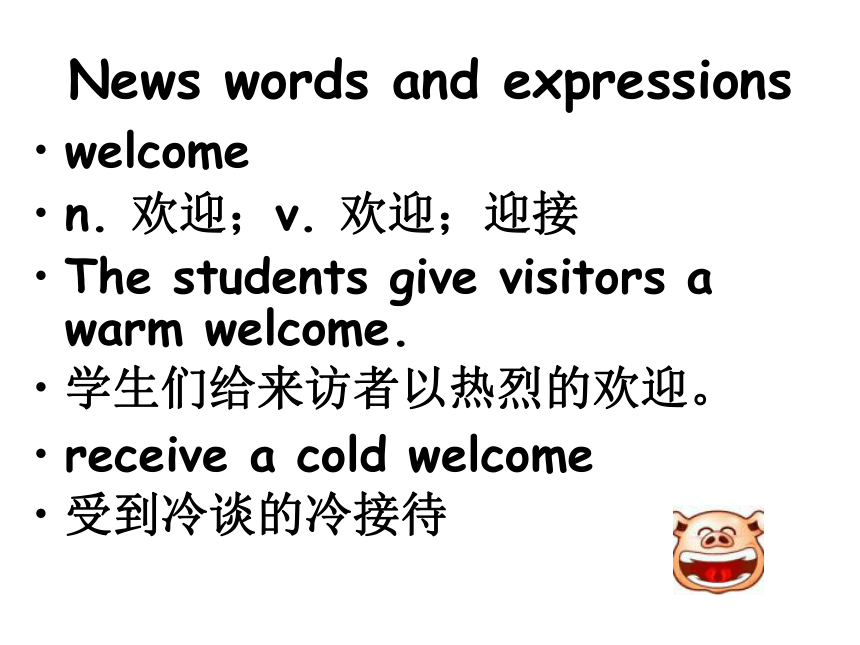
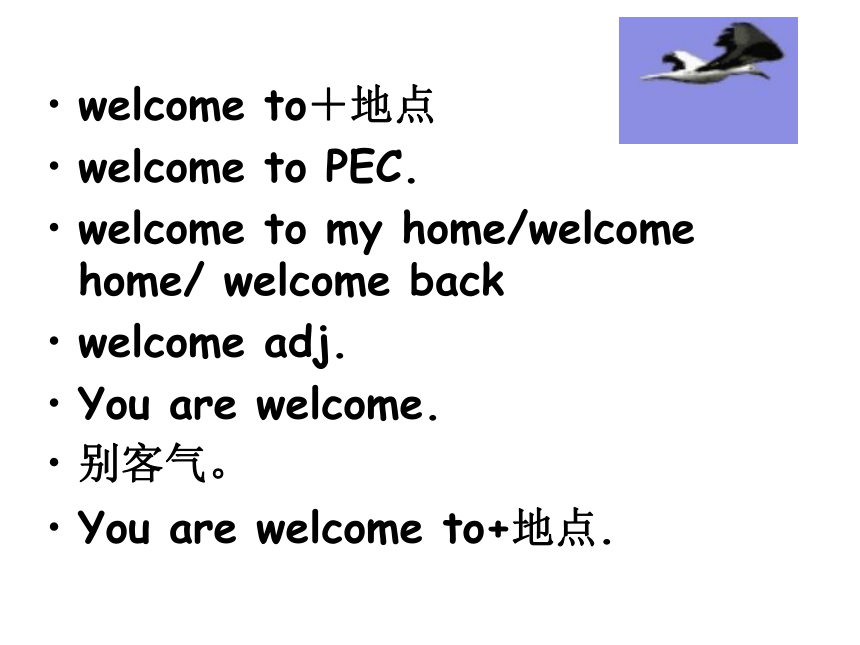
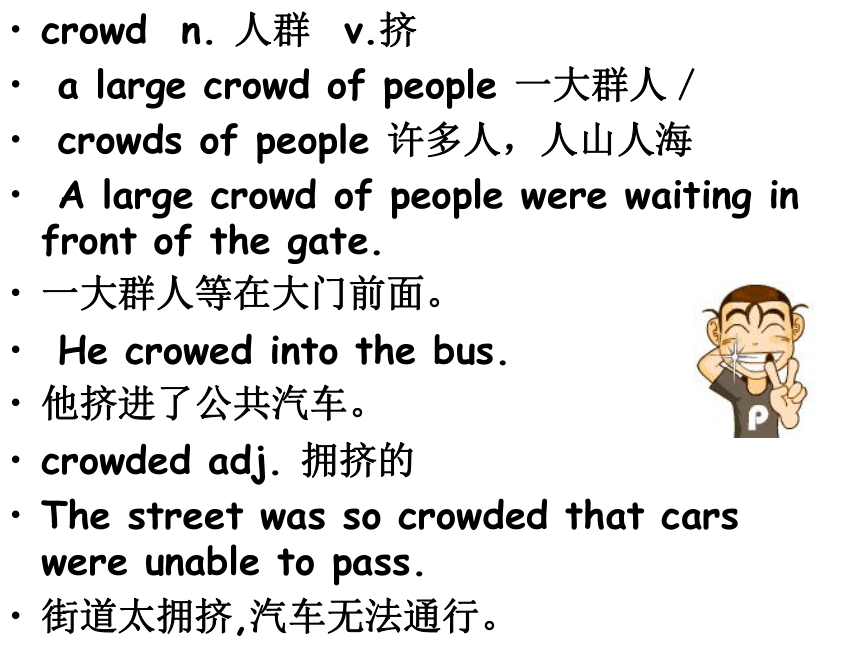
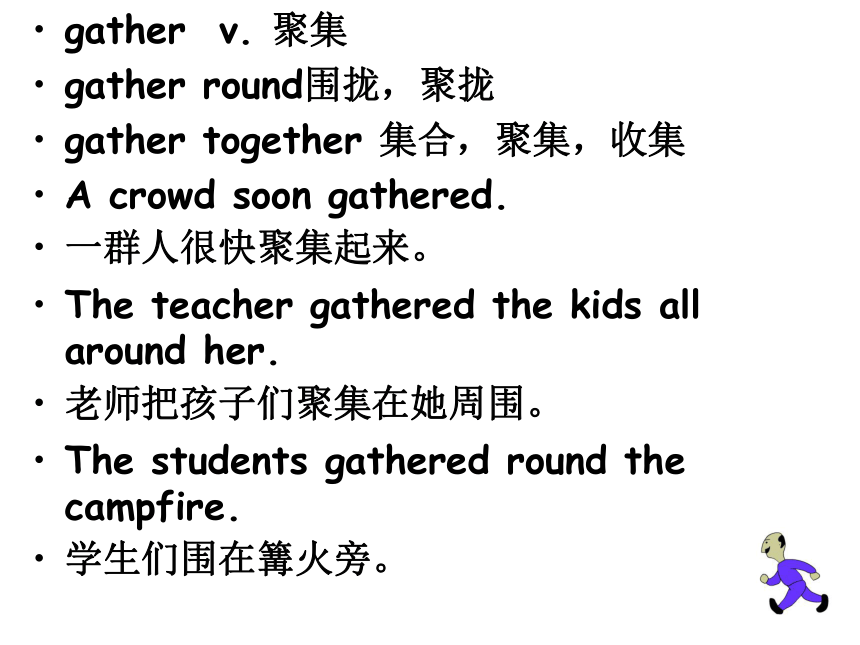
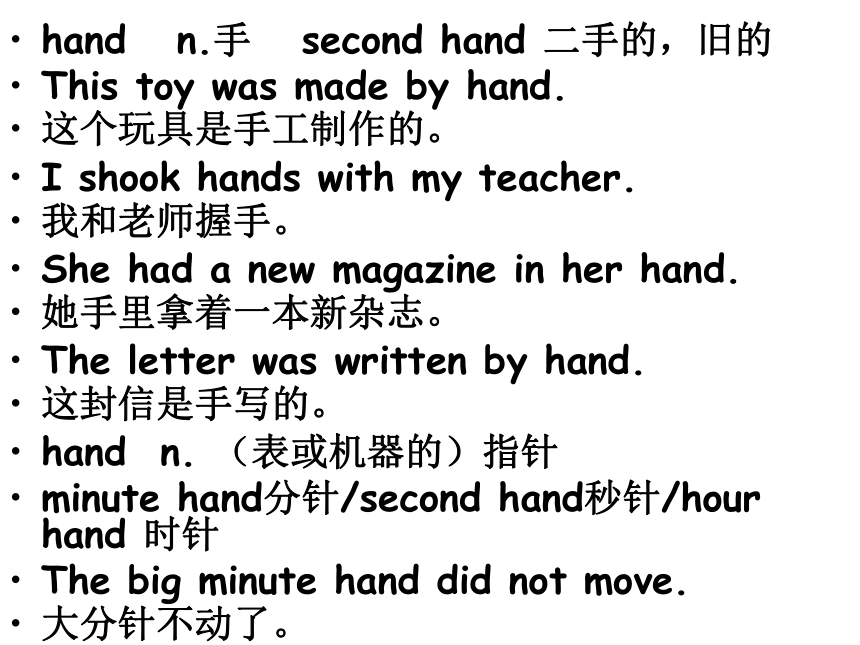
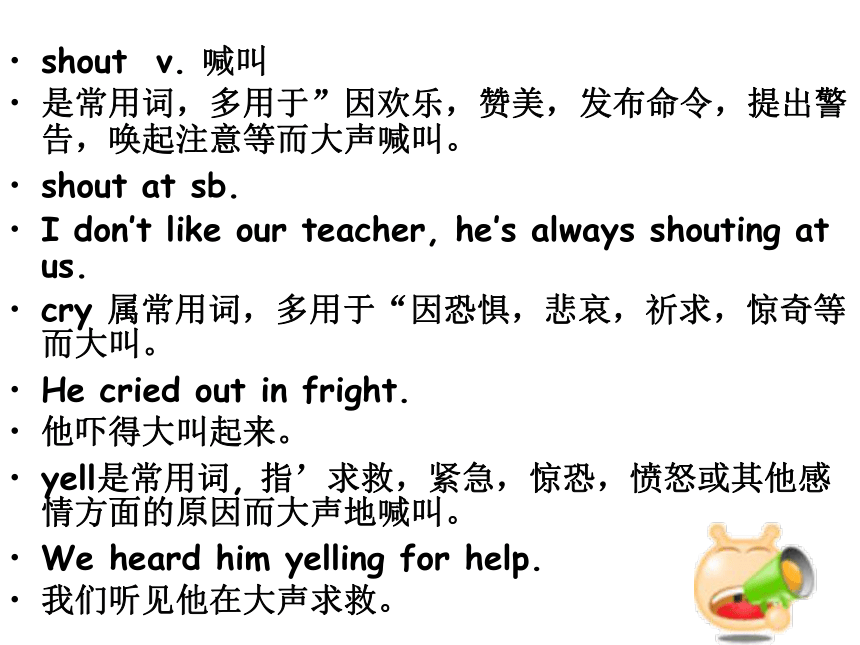
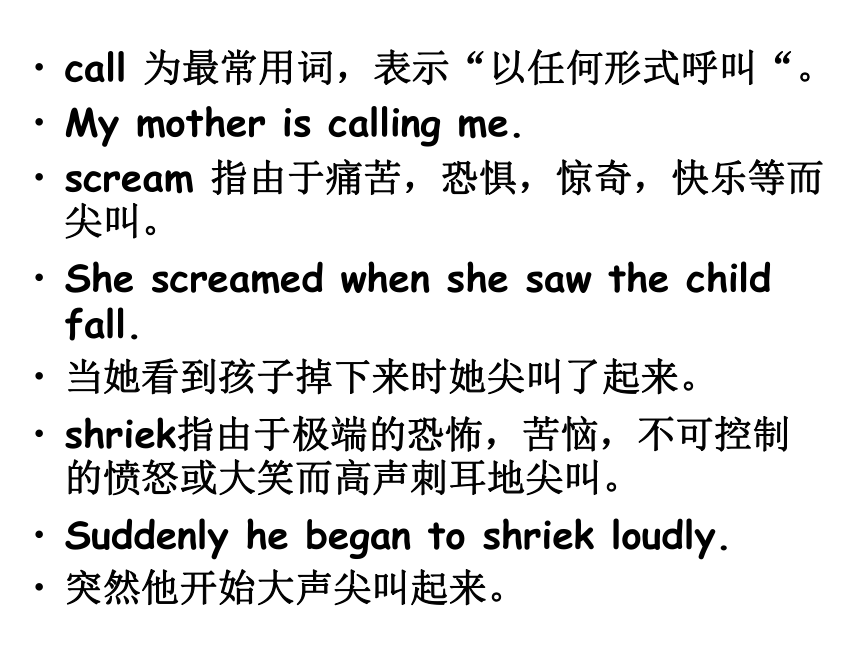
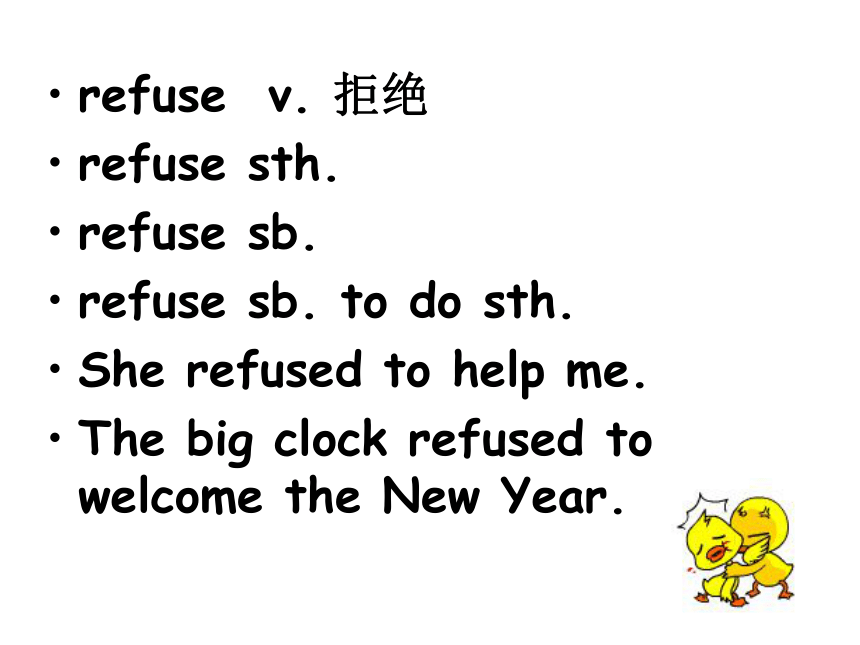
文档简介
(共23张PPT)
News words and expressions
welcome
n. 欢迎;v. 欢迎;迎接
The students give visitors a warm welcome.
学生们给来访者以热烈的欢迎。
receive a cold welcome
受到冷谈的冷接待
welcome to+地点
welcome to PEC.
welcome to my home/welcome home/ welcome back
welcome adj.
You are welcome.
别客气。
You are welcome to+地点.
crowd n. 人群 v.挤
a large crowd of people 一大群人/
crowds of people 许多人,人山人海
A large crowd of people were waiting in front of the gate.
一大群人等在大门前面。
He crowed into the bus.
他挤进了公共汽车。
crowded adj. 拥挤的
The street was so crowded that cars were unable to pass.
街道太拥挤,汽车无法通行。
gather v. 聚集
gather round围拢,聚拢
gather together 集合,聚集,收集
A crowd soon gathered.
一群人很快聚集起来。
The teacher gathered the kids all around her.
老师把孩子们聚集在她周围。
The students gathered round the campfire.
学生们围在篝火旁。
hand n.手 second hand 二手的,旧的
This toy was made by hand.
这个玩具是手工制作的。
I shook hands with my teacher.
我和老师握手。
She had a new magazine in her hand.
她手里拿着一本新杂志。
The letter was written by hand.
这封信是手写的。
hand n. (表或机器的)指针
minute hand分针/second hand秒针/hour hand 时针
The big minute hand did not move.
大分针不动了。
shout v. 喊叫
是常用词,多用于”因欢乐,赞美,发布命令,提出警告,唤起注意等而大声喊叫。
shout at sb.
I don’t like our teacher, he’s always shouting at us.
cry 属常用词,多用于“因恐惧,悲哀,祈求,惊奇等而大叫。
He cried out in fright.
他吓得大叫起来。
yell是常用词, 指’求救,紧急,惊恐,愤怒或其他感情方面的原因而大声地喊叫。
We heard him yelling for help.
我们听见他在大声求救。
call 为最常用词,表示“以任何形式呼叫“。
My mother is calling me.
scream 指由于痛苦,恐惧,惊奇,快乐等而尖叫。
She screamed when she saw the child fall.
当她看到孩子掉下来时她尖叫了起来。
shriek指由于极端的恐怖,苦恼,不可控制的愤怒或大笑而高声刺耳地尖叫。
Suddenly he began to shriek loudly.
突然他开始大声尖叫起来。
refuse v. 拒绝
refuse sth.
refuse sb.
refuse sb. to do sth.
She refused to help me.
The big clock refused to welcome the New Year.
refuse系普通用语。指坚决,果断或坦率地拒绝。
He refused to take the money.
他拒绝接受这笔钱。
decline指较正式,有礼貌的谢绝。
He declined the invitation. 他谢绝邀请
reject指“y以否定,敌对的态度而当面拒绝。
They rejected the damaged goods.
他们拒受受毁的货物。
laugh v. 笑
laugh at 因……而笑,嘲笑。
Don’t laugh at others.
不要嘲笑别人。
We all laughed at his joke.
听了他的笑话我们都大笑起来。
He laughs best who laughs last.
谁笑在最后,谁笑得最好。
laugh指一般的笑 smile微笑
chuckle指低声赫赫地笑 grin露齿而笑
guffaw 捧腹大笑sneer指嘲笑
giggle指咯咯地笑
【课文讲解】
1.on Wednesday evening
in the evening
Wednesday修饰evening
2.Town Hall 市政厅
3.the last day of the year
一年中的最后一天
4.a large crowd of the people 一大群人
5.had gathered 强调事件的时间是过去的过去
6.strike v.
strike the clock敲钟/clock strike钟自己响
Listen, the clock is striking.
strike twelve 数字表示敲击的次数
knock at the door
敲钟用strike,敲门用knock。
hit轻打和strike重击(hit hard)在一定的时候可以互换
beat 连续不断的打
beat drums
7.in twenty minutes' time
20分钟之后
in 表示在段时间以后
根据时态判别in 表示的含义
8.would strike过去将来时,从过去看未来
We will finish class in half an hour.
9.minutes'名词所有格
It will leave in...minutes‘ time
in twenty (minutes‘ time)名词所有格可省略
my mother's ,Kit's, Tom's
名词所有格可以用来表达时间
an hour's time
名词以-s结尾或者本身是以-s结尾的复数名词,所有格加 ’
名词所有格表示时间或距离
How far is the school from here
3 minutes' walk.
10.时间表达法
1.整点 It’s six o’clock
2. 半点前 e.g. 5:25 It’s five twenty-five
It’s twenty-five after/past five
It’s twenty-five minutes past five.
3. 半点后 e.g. 5:55 It’s five fifty-five.
It’s five to six.
It’s five minutes to six.
4.半点 e.g. 6:30 It’s half-past six.
5.一刻钟 e.g. 6:15 It’s six fifteen
It’s a quarter after six.
6:45 It’s six forty-five.
It’s a quarter to seven
pass /past
Fifteen minutes passed and then, the clock stopped.
It’s two minutes past twelve.
pass v.过,通过
She passed me in the street without even saying hello.
I pass the church on my way to work.
Did you pass the English exam
past prep.晚于,迟于,在……之后
It’s half past two.
She walked past the shop.
时刻前的介词用at
at five to twelve作时间状语
11.waited and waited 等啊等啊,强调动作的重复
walked and walked ,run and run
12.The clock has stopped!
现在完成时,强调过去动作导致的结果。
e.g. I have had my breakfast.我已经吃过早餐了
13.It was true...这是一个事实
It was true that+从句
14.refuse to do sth.拒绝去做某事
I refuse to leave.我拒绝离开
I refuse to move.我拒绝移动
15.at that moment: just then
就在那时
at the moment: now
现在,此刻,在此时
At that moment, everybody began to laugh and sing.
【Key structures】
When did you arrived
I arrived at ten o'clock.
at/in/on/others
when...
in 后面接年,月,季节,通常用于大于一天的时间单位。
in the morning; in the afternoon; in the evening
on Wednesday evening; on Friday afternoon
有修饰词用on
in a week; in January; in Feb. in summer; in spring; in autumn; in winter
in 1992;in 1999
at后面接具体的时间,通常用于小于一天的时间单位。
at night; at noon; at five to twelve; at ten o'clock
on后面接星期,月日,通常用于相当于一天的单位。
on Sunday on June 14th, 1989
at dawn at sunrise
in the daytime in the morning
at noon
24 hours in the afternoon
at dusk at sunrise in the evening
at night (in the night)
at midnight
at the dawn of tomorrow
at the noon of the 23rd of August
on the morning of May day
on Christmas morning
on that morning
on Sunday evening
on the night of the 4th
at this time at that time
until 直到……时候
I can't enter for the sports meeting until tomorrow.
from…to...
Everyday we have English class from 8:30 to 11:30
during 在……期间
in the holiday:强调这段时间其中某一点时间,并不表示自始至终
during the holiday 强调假期的从头到尾
He enjoyed himself during his holiday.
I was caught in an accident in the holiday
after在……以后(之后)
I want it back the day after tomorrow.
后天我想把它要回来。
News words and expressions
welcome
n. 欢迎;v. 欢迎;迎接
The students give visitors a warm welcome.
学生们给来访者以热烈的欢迎。
receive a cold welcome
受到冷谈的冷接待
welcome to+地点
welcome to PEC.
welcome to my home/welcome home/ welcome back
welcome adj.
You are welcome.
别客气。
You are welcome to+地点.
crowd n. 人群 v.挤
a large crowd of people 一大群人/
crowds of people 许多人,人山人海
A large crowd of people were waiting in front of the gate.
一大群人等在大门前面。
He crowed into the bus.
他挤进了公共汽车。
crowded adj. 拥挤的
The street was so crowded that cars were unable to pass.
街道太拥挤,汽车无法通行。
gather v. 聚集
gather round围拢,聚拢
gather together 集合,聚集,收集
A crowd soon gathered.
一群人很快聚集起来。
The teacher gathered the kids all around her.
老师把孩子们聚集在她周围。
The students gathered round the campfire.
学生们围在篝火旁。
hand n.手 second hand 二手的,旧的
This toy was made by hand.
这个玩具是手工制作的。
I shook hands with my teacher.
我和老师握手。
She had a new magazine in her hand.
她手里拿着一本新杂志。
The letter was written by hand.
这封信是手写的。
hand n. (表或机器的)指针
minute hand分针/second hand秒针/hour hand 时针
The big minute hand did not move.
大分针不动了。
shout v. 喊叫
是常用词,多用于”因欢乐,赞美,发布命令,提出警告,唤起注意等而大声喊叫。
shout at sb.
I don’t like our teacher, he’s always shouting at us.
cry 属常用词,多用于“因恐惧,悲哀,祈求,惊奇等而大叫。
He cried out in fright.
他吓得大叫起来。
yell是常用词, 指’求救,紧急,惊恐,愤怒或其他感情方面的原因而大声地喊叫。
We heard him yelling for help.
我们听见他在大声求救。
call 为最常用词,表示“以任何形式呼叫“。
My mother is calling me.
scream 指由于痛苦,恐惧,惊奇,快乐等而尖叫。
She screamed when she saw the child fall.
当她看到孩子掉下来时她尖叫了起来。
shriek指由于极端的恐怖,苦恼,不可控制的愤怒或大笑而高声刺耳地尖叫。
Suddenly he began to shriek loudly.
突然他开始大声尖叫起来。
refuse v. 拒绝
refuse sth.
refuse sb.
refuse sb. to do sth.
She refused to help me.
The big clock refused to welcome the New Year.
refuse系普通用语。指坚决,果断或坦率地拒绝。
He refused to take the money.
他拒绝接受这笔钱。
decline指较正式,有礼貌的谢绝。
He declined the invitation. 他谢绝邀请
reject指“y以否定,敌对的态度而当面拒绝。
They rejected the damaged goods.
他们拒受受毁的货物。
laugh v. 笑
laugh at 因……而笑,嘲笑。
Don’t laugh at others.
不要嘲笑别人。
We all laughed at his joke.
听了他的笑话我们都大笑起来。
He laughs best who laughs last.
谁笑在最后,谁笑得最好。
laugh指一般的笑 smile微笑
chuckle指低声赫赫地笑 grin露齿而笑
guffaw 捧腹大笑sneer指嘲笑
giggle指咯咯地笑
【课文讲解】
1.on Wednesday evening
in the evening
Wednesday修饰evening
2.Town Hall 市政厅
3.the last day of the year
一年中的最后一天
4.a large crowd of the people 一大群人
5.had gathered 强调事件的时间是过去的过去
6.strike v.
strike the clock敲钟/clock strike钟自己响
Listen, the clock is striking.
strike twelve 数字表示敲击的次数
knock at the door
敲钟用strike,敲门用knock。
hit轻打和strike重击(hit hard)在一定的时候可以互换
beat 连续不断的打
beat drums
7.in twenty minutes' time
20分钟之后
in 表示在段时间以后
根据时态判别in 表示的含义
8.would strike过去将来时,从过去看未来
We will finish class in half an hour.
9.minutes'名词所有格
It will leave in...minutes‘ time
in twenty (minutes‘ time)名词所有格可省略
my mother's ,Kit's, Tom's
名词所有格可以用来表达时间
an hour's time
名词以-s结尾或者本身是以-s结尾的复数名词,所有格加 ’
名词所有格表示时间或距离
How far is the school from here
3 minutes' walk.
10.时间表达法
1.整点 It’s six o’clock
2. 半点前 e.g. 5:25 It’s five twenty-five
It’s twenty-five after/past five
It’s twenty-five minutes past five.
3. 半点后 e.g. 5:55 It’s five fifty-five.
It’s five to six.
It’s five minutes to six.
4.半点 e.g. 6:30 It’s half-past six.
5.一刻钟 e.g. 6:15 It’s six fifteen
It’s a quarter after six.
6:45 It’s six forty-five.
It’s a quarter to seven
pass /past
Fifteen minutes passed and then, the clock stopped.
It’s two minutes past twelve.
pass v.过,通过
She passed me in the street without even saying hello.
I pass the church on my way to work.
Did you pass the English exam
past prep.晚于,迟于,在……之后
It’s half past two.
She walked past the shop.
时刻前的介词用at
at five to twelve作时间状语
11.waited and waited 等啊等啊,强调动作的重复
walked and walked ,run and run
12.The clock has stopped!
现在完成时,强调过去动作导致的结果。
e.g. I have had my breakfast.我已经吃过早餐了
13.It was true...这是一个事实
It was true that+从句
14.refuse to do sth.拒绝去做某事
I refuse to leave.我拒绝离开
I refuse to move.我拒绝移动
15.at that moment: just then
就在那时
at the moment: now
现在,此刻,在此时
At that moment, everybody began to laugh and sing.
【Key structures】
When did you arrived
I arrived at ten o'clock.
at/in/on/others
when...
in 后面接年,月,季节,通常用于大于一天的时间单位。
in the morning; in the afternoon; in the evening
on Wednesday evening; on Friday afternoon
有修饰词用on
in a week; in January; in Feb. in summer; in spring; in autumn; in winter
in 1992;in 1999
at后面接具体的时间,通常用于小于一天的时间单位。
at night; at noon; at five to twelve; at ten o'clock
on后面接星期,月日,通常用于相当于一天的单位。
on Sunday on June 14th, 1989
at dawn at sunrise
in the daytime in the morning
at noon
24 hours in the afternoon
at dusk at sunrise in the evening
at night (in the night)
at midnight
at the dawn of tomorrow
at the noon of the 23rd of August
on the morning of May day
on Christmas morning
on that morning
on Sunday evening
on the night of the 4th
at this time at that time
until 直到……时候
I can't enter for the sports meeting until tomorrow.
from…to...
Everyday we have English class from 8:30 to 11:30
during 在……期间
in the holiday:强调这段时间其中某一点时间,并不表示自始至终
during the holiday 强调假期的从头到尾
He enjoyed himself during his holiday.
I was caught in an accident in the holiday
after在……以后(之后)
I want it back the day after tomorrow.
后天我想把它要回来。
同课章节目录
